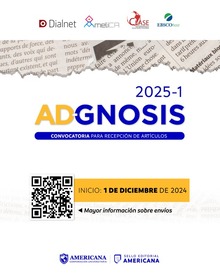Tendencies of the University Social Responsibility (MSW) of the Institutions of Higher Education (IES) in the city of Medellin-Colombia
DOI:
https://doi.org/10.21803/adnogsis.v6i6.193Keywords:
Social Responsibility, Universities, Ministry of Education, Higher EducationAbstract
The organization of networks or other systems of collective action around the University Social Responsibility (USR) in the city of Medellin have been presented of itinerant form in the last decade, but their presence in the management of some Institutions of higher education (IES) has been decisive, this is evidenced in the fulfillment of governmental policies with affinity to the USR, such as the annual accountability of the public IES. Similarly, it is observed that the USR directly or indirectly is the subject of work in the IES, mediated by the requirements of the policy of quality assurance of the Ministry of National Education (MEN), which has strengthened the requirements of approval of Institutions, programs and processes in a growing dynamic that Latin America already knows in a decisive way: Quality requirements and accreditations. The present text which abridges elements of a research project financed by the Tecnolo?gico de Antioquia I.U. in the years 2016 and 2017, seeks from a hermeneutical proposal, and using primary and secondary sources of information, to reveal the trends presented by the USR developed by the IES in the city of Medelli?n (Colombia) in the last decade, from the relevant events that occurred, as well as from the tendencies that became evident from their efforts.
Keywords: Social Responsibility, Universities, Ministry of Education, Higher Education.
Downloads
References
Cordero, I. (2013). Dida?ctica y ensen?anza del Derecho en las universidades. Pensamiento Americano, 6(11), 29-34.
Cortina, A. (1996). E?tica de la empresa: Claves para una nueva cultura empresarial (2a ed.). Madrid: McGraw-Hill.
Declaración Universal sobre Bioética y Derechos Humanos adoptada por la UNESCO (2005). Conferencia General de la UNESCO, París.
Desarrollo Humano Informe (1990). Bogotá, Colombia. Publicado para el PNUD por Tercer Mundo Editores.
Freeman, R. E. (1997). Stakeholder theory. In P. H. Werhane & R. E. Freeman (Eds.), The Blackwell Encyclopedic Dictionary of Business Ethics. Oxford/Malden, MA: Blackwell.
Garci?a, A., Go?mez, O., Mera, O. & Pabón, Y. (2014). Evolucio?n de la responsabilidad social empresarial y la experiencia en el sector financiero. Revista TEMAS, 3(8), 249-260.
Gond, J. (2008). La Responsabilidad Social de la Empresa. Pari?s. Universidad de Francia.
Gonza?lez, E. (2007). La teori?a de los Stakeholders. Un puente para el desarrollo pra?c- tico de la e?tica empresarial y la Responsabilidad Social Corporativa. VERITAS, II(17).
International Organization for Standardization ISO (2010). Norma Internacional ISO 26000, Gui?a de Responsabilidad Social. Ginebra, Suiza: ISO.
Lo?pez, A. & Contreras, R. (2010). El concepto Responsabilidad Social Empresarial desde diversos enfoques teo?ricos. Ide@s CONCYTEG, 5(58).
Meji?a, J. (2011). E?tica de la responsabilidad en los tiempos contempora?neos: con- sideraciones centrales. Paradigmas, 3, 33-48.
Montoya Are?valo, B. E. & Martínez Ramos, P. (2012). Responsabilidad Social Empresarial: Una respuesta e?tica ante los desafíos globales. Fundacio?n Konrad Adenauer.
Morin, E. (2004). El Me?todo VI. E?tica. Madrid: Ca?tedra.
ONU (1987). Informe Brundtland. Nuestro futuro comu?n compartido. Recuperado de: http://www.aytotoledo.org/medioambiente/a21/BRUNDTLAND.pdf
Vallaeys, F., Sasia, P. & De la Cruz, C. (2009). Manual de los primeros pasos en Responsabilidad Social, construyendo ciudadani?a en universidades responsables. Recuperado el 10 de julio de 2017 en el sitio web
http://blog.pucp.edu.pe/blog/wpcontent/uploads/sites/54/2012/05/manual_digital_bid_rsu.pdf
Downloads
Published
Versions
- 2023-01-31 (2)
- 2017-12-08 (1)
Issue
Section
License
Copyright (c) 2023 AD-GNOSIS

This work is licensed under a Creative Commons Attribution-NonCommercial-NoDerivatives 4.0 International License.






